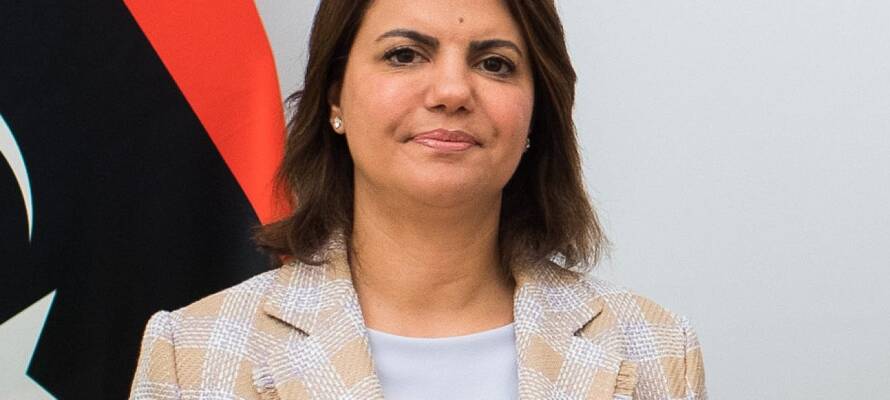Libyan prime minister suspends foreign minister a day after Israel revealed its chief diplomat met with her last week.
By Samy Magdy, Associated Press
One of Libya’s rival prime ministers said Monday he has suspended his foreign minister a day after Israel revealed that its chief diplomat met with her last week — news that prompted scattered street protests in the chaos-stricken North African nation.
Abdul Hamid Dbeibah, who heads the government of national unity in the capital, Tripoli, also referred Foreign Minister Najla Mangoush for investigation over the meeting, which was the first ever between top diplomats of Libya and Israel.
Israeli Foreign Minister Eli Cohen and Mangoush met in Rome last week. It was a small breakthrough for Israel’s government, whose hard-line policies toward the Palestinians have led to a cooling of its burgeoning ties with the Arab world.
Cohen said they discussed the importance of preserving the heritage of Libya’s former Jewish community, including renovating synagogues and cemeteries. The talks also touched on possible Israeli assistance for humanitarian issues, agriculture and water management, according to Israel’s Foreign Ministry.
The Libyan foreign ministry, meanwhile, sought to downplay the importance of the meeting as “unprepared and an unofficial meeting during a meeting with Italy’s foreign minister. It said in a statement that Mangoush’s encounter with Cohen didn’t include “any talks, agreements or consultations.”
Dbeibah’s decision to suspend Mangoush suggested that he was not aware of the meeting. However, two senior Libyan government officials told The Associated Press the prime minister did know about the talks between his foreign minister and the Israeli chief diplomat.
One of the officials said Dbeibah gave the green light for the meeting last month when he was on a visit to Rome. The prime minister’s office arranged the encounter in coordination with Mangoush, he said.
The second official said the meeting lasted for about two hours and Mangoush briefed the prime minister directly after her return to Tripoli. The official said the meeting crowned U.S.-brokered efforts to have Libya join a series of Arab countries establishing diplomatic ties with Israel.
The official said normalization of relations between Libya and Israel was first discussed in a meeting between Dbeibah, and CIA Director William Burns, who visited the Libyan capital in January.
The Libyan premier gave initial approval for joining the U.S.-brokered Abraham Accords, but he was concerned about public backlash in a country known for its past support for the Palestinian cause, the official said.
Both officials spoke on condition of anonymity for their safety.
Jalel Harchaoui, an associate fellow specializing in Libya at the London-based Royal United Services Institute for Defence and Security Studies, said Dbeibah has sought to please foreign governments as he has come under growing pressure from the U.N. and other countries over the political stalemate in his nation.
Harchaoui said the Libyan prime minister’s decision to suspend his foreign minister “undoubtedly” aimed at calming public anger.
Israel’s foreign ministry did not respond to reporters’ questions early Monday, including whether Cohen’s announcement had been coordinated with Libya.
Libya was plunged into chaos after a NATO-backed uprising toppled longtime dictator Moammar Gadhafi in 2011. The oil-rich country has been split between the Western-backed government in Tripoli and a rival administration in the country’s east. Each side has been backed by armed groups and foreign governments. Gadhafi was hostile to Israel and a staunch supporter of the Palestinians, including radical militant groups opposed to peace with Israel.
Sunday’s announcement of the meeting prompted scattered protests in Tripoli and other towns in western Libya. Protesters stormed the foreign ministry headquarters to condemn the meeting, while others attacked and burned a residence for the prime minister in Tripoli, according to local reports.
In the town of Zawiya protesters burned the Israeli flag, while others held the Palestinian flag. There were also protests in the city of Misrata, a stronghold for Dbeibah, according to footage circulated on social media and verified by The Associated Press.
MAKE THE LAND OF ISRAEL EVEN MORE BEAUTIFUL!
PLANT YOUR VERY OWN FRUIT TREES IN ISRAEL!
Farmers near the Gaza border lost family, friends and workers. Spring is here, and they desperately need help to replant the farms. Join us in blessing the People and Land of Israel.
“I will ordain My blessing for you…” (Leviticus 25:4)



